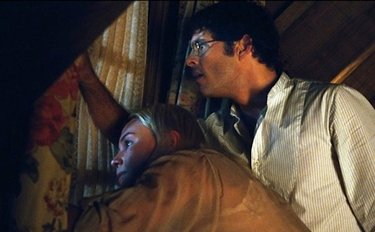 Watch out, liberals! Republicans are coming to get you.
Watch out, liberals! Republicans are coming to get you.
The original Sam Peckinpaugh (1971) “Straw Dogs” was actually a pretty stupid film trafficking in the worst king of pop psychology clichés about sex, masculinity, and violence, but according to the New York Times’ reviewer A.O. Scott, the remake opening today, will be at least an interesting curiosity.
The new director has evidently removed some of poor old, pickled-in-alcohol and obsessed-with-violence, Sam Peckinpaugh’s personal dark obsessions, and has turned the remake into a cheerful tale of civilized Blue State elites turning the tables on violent, gun-and-God obsessed rednecks. Coastal elites may be losing in the political polls, but they can cheer in the movie house when the wimpy liberal takes out the Palin voter with a nail gun.
“Straw Dogs†— Rod Lurie’s odd and interesting remake of Sam Peckinpah’s venerable and violent button pusher — begins with a clash of cultural stereotypes. David Sumner (James Marsden) is a Hollywood screenwriter with an Ivy League education (or at least a Harvard T-shirt and fond memories of the Harvard-Yale game), newly arrived in his wife’s hometown, Blackwater, Miss. He is an effete coastal liberal, the kind of person who orders light beer at the local bar and grill, disdains its celebrated fried pickles and tries to pay with a credit card. He listens to classical music, uses big words like “acutely†and stays in shape by jumping rope. He can’t fix a roof or change a tire.
The local guys, for their parts, swear and fight and love guns, God and football. They listen to Lynyrd Skynyrd, and a few of them look as if they could moonlight as roadies for that shaggy, tragic Southern band. They leer at David’s wife, Amy (Kate Bosworth), and are generally ill-mannered when they are not being ostentatiously and menacingly polite. They work with their hands and aren’t much for book learning. On an especially hot day, one of them says, “This must be that global warmin’ you educated fellers are always goin’ on about.â€
The hyperbole is more amusing than offensive. Mr. Lurie, a former film critic whose earlier movies include politically tinged thrillers like “The Contender†and “Nothing but the Truth,†is holding a fun-house mirror up to an America that seems, at the moment, to thrive on polarization and mutual contempt. The reality is more complicated, but something of the corrosive, absurd logic of the culture wars is captured in the interactions between David and the gang of good ol’ boys who become his mortal enemies.
They are led by Charlie (Alexander Skarsgard), a big, blond, handsome ex-jock who dated Amy in high school. He artfully exposes David’s snobbery and also plays on the newcomer’s liberal habits of deference and self-reproach. David may indeed think that he’s better than the residents of Blackwater, as Charlie insinuates, but he also accepts the idea, so central to their sense of identity, that the locals are more authentic than he is, closer to God and the earth and the real America.
So he tries to compromise and adapt to their ways, which only amplifies their contempt. He is someone to be mocked, abused and taken advantage of, but never respected. Finally, after too many indignities and too much bullying, he has no choice but to fight back.
There is an obvious political allegory here, and it’s possible that “Straw Dogs†will find a cult following among frustrated Democrats going into the next electoral cycle. …
The setting and some details have changed — the previous David was a mathematician, writing a scholarly book instead of a screenplay on the Battle of Stalingrad — but the story and the characters are fundamentally the same. …
Mr. Lurie’s movie does not quite succeed on its own, though it is pulpy and brutal and at times grotesquely comical. The story does not cohere, and the performances are uneven. But as a piece of film criticism — as a conversation with, and interpretation of, an earlier film — it is intriguing.
“Straw Dogs†has often been understood as an exposé of David’s hypocrisy, a revelation of the beast that lurks in the heart of even the most civilized and passive modern man. But David’s homicidal frenzy is not really a descent into the primal, macho swamp of vengeance and self-defense where his antagonists have always been content to dwell. He is not defending Amy or punishing her rapists — in neither version does she tell him about the attack — but rather taking up arms in defense of two abstract ideas: the sanctity of private property and the importance of due process.
No wonder the blue-state audience at the screening I attended cheered and hooted as David made ingenious use of a nail gun, a bear trap and two pots of boiling oil to keep his tormentors at bay. I’m kidding, to some extent. The response to righteous movie mayhem is always more visceral than philosophical. But “Straw Dogs†does give you something to think about.
——————————





Please Leave a Comment!